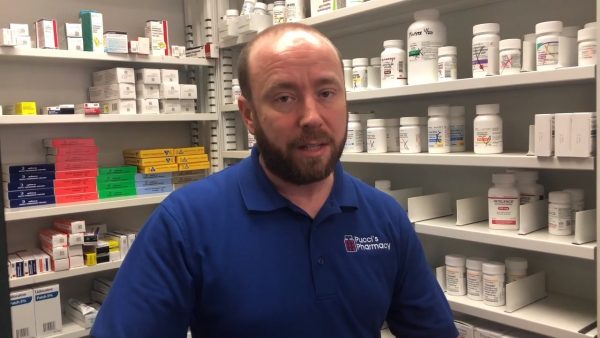
A new California law that aims to ease barriers to medication that can reduce the risk of HIV has pharmacists around the state preparing to offer a pair of drugs that today are only available if a doctor prescribes them.
The new law, Senate Bill 159, allows pharmacists to distribute the antiretroviral medications PrEP and PEP without a physician’s prescription. It also prohibits insurance companies from requiring people to obtain prior authorization before using insurance benefits to acquire the medication.
Pre-exposure prophylaxis, known as PrEP, can reduce the risk of HIV from sex by about 99 percent if taken correctly according to the Centers for Disease Control and Prevention.
Post-exposure prophylaxis, known as PEP, can stop the virus from replicating if taken within a 72-hour window after possible exposure has occurred.
One of the law’s authors, Sen. Todd Gloria, D-San Diego, said he believes that improving accessibility of PrEP and PEP will lead more people in underserved communities to use the medication.
“Poverty is a driver for this disease now,” Gloria said.
He wrote the law with Sen. Scott Wiener, D-San Francisco, who in 2014 disclosed that he takes PrEP. Wiener wanted to raise awareness about the medication.
“Ninety-nine percent of the feedback I got was enthusiastically positive, among LGBT people, straight people, and around the country. So I think it was a very positive thing,” he said.
Clint Hopkins, owner and pharmacist in charge of Pucci’s Pharmacy in Sacramento supported the law and plans to be a PrEP and PEP provider.
“I do not think there will be a downside,” Hopkins said in an email. “There should not be any stigma placed around (sexually transmitted infections). Stigmatizing natural sexual behavior is what increases the transmission of (sexually transmitted infections) because when people feel shamed by their medical provider, they are less likely to seek treatment.”
Hopkins said that although PrEP and PEP will be available through pharmacists which increases access, these medications should not be considered “over the counter” as in people will be able to grab them off the shelf like Tylenol or Claritin.
To access PrEP, Hopkins said patients will be able to either present a recent HIV negative test result to a participating pharmacist, or the pharmacy can perform the HIV test via a pharmacist who is appropriately credentialed with the California Department of Public Health to perform HIV tests.
Only after the pharmacist has confirmed the patient is HIV negative will the patient be prescribed PrEP. The law limits the PrEP supply that pharmacists can dispense to a maximum of 60 days so people may still need to see their medical providers.
While HIV testing is not mandatory under the law for pharmacists to administer PEP in post-exposure scenarios, Hopkins said CDC guidelines recommend HIV testing for anyone seeking these preventative medications.
Veronica Ramirez, a nurse practitioner and HIV specialist who works in primary care and HIV specialty care at One Community Health in Sacramento is also in favor of the law, although she said she fears the uptake of PrEP and PEP may not increase dramatically because pharmacies are not required by law to provide these medications. Pharmacists can choose not to administer the medications.
“I think there will be some more uptake but I don’t think the uptake will be to the extent that is desired because there is still going to be some barriers. I don’t know how many pharmacies are going to actually go through with sending pharmacist for training to be an HIV certified test counselor,” she said.
Ramirez said the law might prove most helpful by allowing people to obtain PEP quickly and without prior authorization for their insurers. The medication is most effective in the days just after potential exposure to HIV.
“If someone is seeking PEP at the end of their 72-hour window and then their insurance says ‘no, we’re not going to cover this, why do you need this medication?’ that can put them outside of the window that we think it would be most effective,” Ramirez said. “And also sometimes people end up missing their next PrEP dose because their insurance changed. So again, there can be a gap in treatment and it really works better if people are consistent in taking it daily.”
This story is part of a collaborative project between McClatchy and seniors in the journalism program at Sacramento State University. For more information about the program, or to send a message, visit facebook.com/sacstatejournalism.